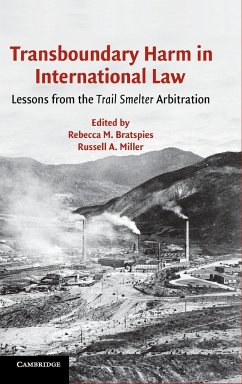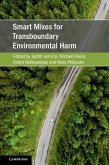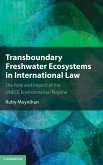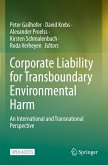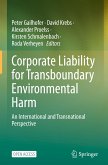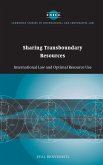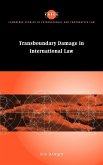This volume examines how states respond to public and private actions that cause harms across international borders.
Many harms flow across the ever-more porous sovereign borders of a globalizing world. These harms expose weaknesses in the international legal regime built on sovereignty of nation states. Using the Trail Smelter Arbitration, one of the most cited cases in international environmental law, this book explores the changing nature of state responses to transboundary harm. Taking a critical approach, the book examines the arbitration's influence on international law generally, and international environmental law specifically. In particular, the book explores whether there are lessons from Trail Smelter that are useful for resolving transboundary challenges currently confronting the international community. The book collects the commentary of a distinguished set of international law scholars who consider the history of the Trail Smelter arbitration, its significance for international environmental law, its broader relationship to international law, and its resonance in fields beyond the environment.
Table of contents:
Introduction; Part I. The Trail Smelter Arbitration - History, Legacy and Revival: A. History: 1. An outcrop of Hell: history, environment, and the politics of the Trail Smelter Dispute James R. Allum; 2. The Trail Smelter Dispute John E. Read; B. Roots and legacy: 3. Of paradoxes, precedents and progeny: the Trail Smelter Arbitration 65 years later Stephen C. McCaffrey; 4. Pollution by analogy: the Trail Smelter Arbitration Alfred P. Rubin; 5. Has international law outgrown Trail Smelter? Jaye Ellis; 6. The flawed Trail Smelter procedure: the wrong tribunal, the wrong parties, and the wrong law John H. Knox; 7. Re-reading Trail Smelter Karin Mickelson; 8. Trail Smelter and the International Law Commission's work on state responsibility for internationally wrongful acts and state liability Mark A. Drumbl; 9. Derivative Versus Direct Liability as a basis for state liability for transboundary harms Mark Anderson; C. Return to Trail: 10. Transboundary pollution, unilateralism and the limits of extraterritorial jurisdiction: the second Trail Smelter Dispute Neil Craik; Part II. Trail Smelter and Contemporary Transboundary Harm - The Environment: 11. Trail Smelter in contemporary international environment law: its relevance in the nuclear energy context Günther Handl; 12. Through the looking glass: sustainable development and other emerging concepts of international environmental law in the Gabcikovo-Nagymaros case and the Trail Smelter arbitration James F. Jacobson; 13. Trail Smelter's (semi) precautionary legacy Rebecca M. Bratspies; 14. Surprising parallels between Trail Smelter and the global climate change regime Russell A. Miller; 15. Sovereignty's continuing importance: traces of Trail Smelter in the international law governing hazardous waste transport Austen L. Parrish; 16. The legacy of Trail Smelter in the field of transboundary air pollution Phoebe Okowa; 17. The impact of the Trail Smelter Arbitration on the law of the sea Stuart M. Kaye; Part III. Trail Smelter and Contemporary Transboundary Harm - Beyond the Environment: 18. Trail Smelter and terrorism: international mechanisms to combat transboundary harm Pierre-Marie Dupuy and Cristin Hob; 19. The conundrum of corporate social responsibility: reflections on the changing nature of firms and states Peer Zumbansen; 20. A pyrrhic victory: applying the Trail Smelter principle to State creation of refugees Jennifer Peavey Joanis; 21. Transboundary harm: internet torts Holger P. Hestermeyer; 22. International drug pollution? Reflections on Trail Smelter and Latin American drug trafficking Judith Wise and Eric L. Jensen; 23. Application of international human rights conventions to transboundary state acts Nicola Vennemann; Annex: convention for settlement of difficulties arising from operation of Smelter at Trail, British Columbia, Trail Smelter Arbitral Decision 1938, and Trail Smelter Arbitral Decision 1941.
Hinweis: Dieser Artikel kann nur an eine deutsche Lieferadresse ausgeliefert werden.
Many harms flow across the ever-more porous sovereign borders of a globalizing world. These harms expose weaknesses in the international legal regime built on sovereignty of nation states. Using the Trail Smelter Arbitration, one of the most cited cases in international environmental law, this book explores the changing nature of state responses to transboundary harm. Taking a critical approach, the book examines the arbitration's influence on international law generally, and international environmental law specifically. In particular, the book explores whether there are lessons from Trail Smelter that are useful for resolving transboundary challenges currently confronting the international community. The book collects the commentary of a distinguished set of international law scholars who consider the history of the Trail Smelter arbitration, its significance for international environmental law, its broader relationship to international law, and its resonance in fields beyond the environment.
Table of contents:
Introduction; Part I. The Trail Smelter Arbitration - History, Legacy and Revival: A. History: 1. An outcrop of Hell: history, environment, and the politics of the Trail Smelter Dispute James R. Allum; 2. The Trail Smelter Dispute John E. Read; B. Roots and legacy: 3. Of paradoxes, precedents and progeny: the Trail Smelter Arbitration 65 years later Stephen C. McCaffrey; 4. Pollution by analogy: the Trail Smelter Arbitration Alfred P. Rubin; 5. Has international law outgrown Trail Smelter? Jaye Ellis; 6. The flawed Trail Smelter procedure: the wrong tribunal, the wrong parties, and the wrong law John H. Knox; 7. Re-reading Trail Smelter Karin Mickelson; 8. Trail Smelter and the International Law Commission's work on state responsibility for internationally wrongful acts and state liability Mark A. Drumbl; 9. Derivative Versus Direct Liability as a basis for state liability for transboundary harms Mark Anderson; C. Return to Trail: 10. Transboundary pollution, unilateralism and the limits of extraterritorial jurisdiction: the second Trail Smelter Dispute Neil Craik; Part II. Trail Smelter and Contemporary Transboundary Harm - The Environment: 11. Trail Smelter in contemporary international environment law: its relevance in the nuclear energy context Günther Handl; 12. Through the looking glass: sustainable development and other emerging concepts of international environmental law in the Gabcikovo-Nagymaros case and the Trail Smelter arbitration James F. Jacobson; 13. Trail Smelter's (semi) precautionary legacy Rebecca M. Bratspies; 14. Surprising parallels between Trail Smelter and the global climate change regime Russell A. Miller; 15. Sovereignty's continuing importance: traces of Trail Smelter in the international law governing hazardous waste transport Austen L. Parrish; 16. The legacy of Trail Smelter in the field of transboundary air pollution Phoebe Okowa; 17. The impact of the Trail Smelter Arbitration on the law of the sea Stuart M. Kaye; Part III. Trail Smelter and Contemporary Transboundary Harm - Beyond the Environment: 18. Trail Smelter and terrorism: international mechanisms to combat transboundary harm Pierre-Marie Dupuy and Cristin Hob; 19. The conundrum of corporate social responsibility: reflections on the changing nature of firms and states Peer Zumbansen; 20. A pyrrhic victory: applying the Trail Smelter principle to State creation of refugees Jennifer Peavey Joanis; 21. Transboundary harm: internet torts Holger P. Hestermeyer; 22. International drug pollution? Reflections on Trail Smelter and Latin American drug trafficking Judith Wise and Eric L. Jensen; 23. Application of international human rights conventions to transboundary state acts Nicola Vennemann; Annex: convention for settlement of difficulties arising from operation of Smelter at Trail, British Columbia, Trail Smelter Arbitral Decision 1938, and Trail Smelter Arbitral Decision 1941.
Hinweis: Dieser Artikel kann nur an eine deutsche Lieferadresse ausgeliefert werden.

